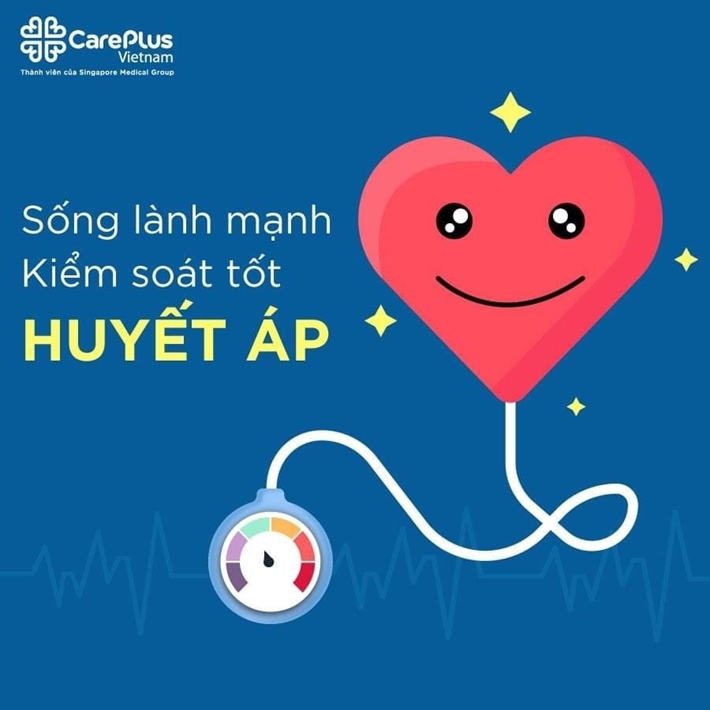10 ways to control high blood pressure without medication
For people with primary high blood pressure, medication is the first line of treatment to control blood pressure. However, reasonable changes in diet, living habits, and exercise can help reduce blood pressure. This can help control blood pressure better, avoid complications of the disease, and in some cases can even help reduce the dose of medication or reduce the number of medications taken daily.

5/19/2021 12:24:20 AM
Please pocket the following ten tips that are "revealed" by CarePlus Cardio Care's Cardiologists! Guaranteed effective in keeping your blood pressure more stable!
However, keep in mind that these tips help keep blood pressure under control, not replacing medication. If you want to have a better blood pressure value, use less medication, have a healthier body, and have a lower risk of complications from high blood pressure, here are very important suggestions for you to effectively.
1. Lose weight
On average, for overweight/obese subjects, losing 1kg of weight can reduce blood pressure by about 1mmHg. The blood pressure-lowering effect may be even more pronounced in severely obese individuals (2 mmHg reduction per kg body weight). Some people who are not overweight but have a large waist are still at risk of high blood pressure. Therefore, keeping the waist circumference <90cm for men and <80cm for women is important.
2. Exercise
Exercising at least 30 minutes a day, at least five days a week helps reduce blood pressure by 5-10 mmHg. Sports such as walking, jogging, cycling, swimming, and dancing help the body use oxygen to the maximum, very effective support for the cardiovascular system. Attention should be paid to maintaining regular exercise because the effect will not be obvious on day one, day two, but it will disappear quickly when we stop practicing for a while.
3. Reduce salty food
Eating salty foods is a cause of ineffective high blood pressure medication, increasing the risk of hospitalization for high blood pressure and increasing the risk of dangerous complications such as stroke and heart attack. When eating less than 6g of salt per day can help reduce blood pressure by 5-8mmHg.
4. Eat lots of green vegetables, fruits, fiber, limit saturated fat
Every day, you need to eat at least five servings of green vegetables or fruits (1 serving of green vegetables is equivalent to 2 palms, one serving of fruit is equal to the size of 1 hand). Increase fiber-rich foods such as legumes, corn, whole-wheat barley, brown rice, bananas, guava, plums, mangoes, raspberries, vegetables. Limit saturated and trans fats such as butter, cake, fast food, cakes, bread. Use skim milk instead of whole milk. This diet, combined with reducing salt intake, can help people with high blood pressure reduce 10-15mmHg.
5. Quit smoking
People with high blood pressure should try to quit smoking as soon as possible. Smoking reduces the effectiveness of blood pressure medications, increasing the risk of life-threatening complications such as stroke and heart attack.
6. Use alcohol in moderation
Drinking alcohol in moderation will help reduce blood pressure by 2-4 mmHg. However, exceeding the permissible threshold will be a significant increase in blood pressure. Men can drink up to 2 cans of beer per day, about two glasses of wine (each glass is 2/3 full), and about two small glasses of brandy (whiskey). For women and underweight people, this amount of alcohol should be reduced by half.
7. Use coffee sensibly
Coffee causes an increase in blood pressure after drinking, but this effect is usually transient, and the growth is not much. In particular, this phenomenon can disappear in regular coffee users (the body is "accustomed" to coffee). However, if you are sensitive to coffee, this phenomenon can cause high blood pressure to last longer, causing rapid heart rate, nervousness, headache nervousness. You can detect this yourself if you measure your blood pressure 30 minutes after drinking coffee and the value increases > 5mmHg. You can drink about 3 cups of coffee per day (size M 12oz of most stores in Vietnam).
8. Stress relief
Stress is a very important cause of hypertension and cardiovascular disease. Stress causes an increase in the patient's baseline blood pressure, increases the inflammatory process in the blood vessels, and increases the degree of atherosclerosis. It is necessary to maintain an optimistic and happy lifestyle, avoiding excessive anxiety about illness. Yoga, qigong, nourishment, music, and painting are all great ways to relieve stress.
9. Get enough sleep
Adults should sleep an average of 7-9 hours/day. Older adults may sleep less. However, the quality of sleep is more important than the duration of sleep. If you have symptoms of lethargy, fatigue, poor concentration, and cravings for rest during the day, this is a sign that you are sleep-deprived. Getting enough sleep helps to reduce stress in the body. In addition, symptoms such as nocturia, difficulty breathing, restless feet, sleep apnea, etc., can disrupt sleep - these are very important signs to watch out for in people with high blood pressure.
10. Self-monitoring of blood pressure at home
Knowing your normal blood pressure values and self-monitoring your blood pressure at home helps you feel more confident and better understand your illness. Studies show that people who self-monitor their blood pressure at home are better able to control their blood pressure, use their medications more rationally, and reduce more dangerous cardiovascular events than those who don't.